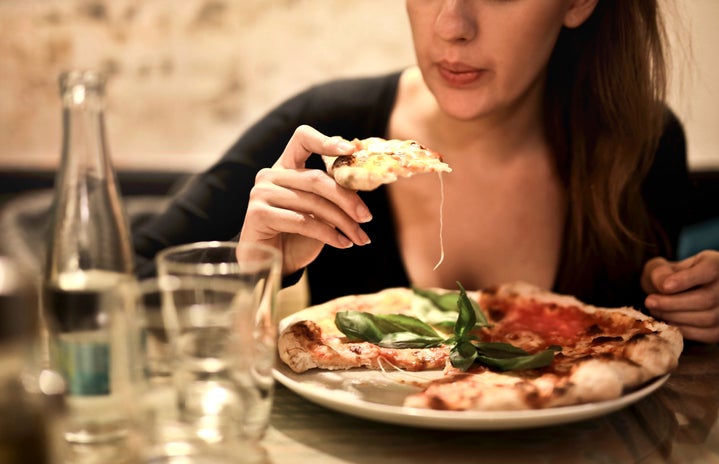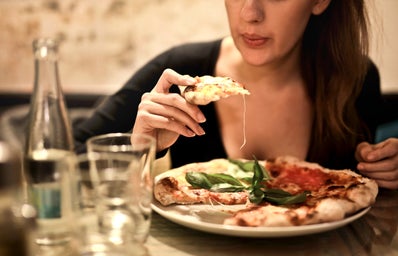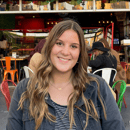It’s a new year, and you know what that means: Every media platform is flooded with “new year, new me” diet messaging. While the new year can be a welcome opportunity for a fresh start in many ways, it’s not a time to buy into content from diet companies who try to exploit insecurities for profit.
Intuitive Eating is an alternative to the diet mindset that brings the body’s needs to the front of mind. Bridget Shannon, the founder of Her Campus at UConn, is a Certified Intuitive Eating Counselor who co-founded Wisebodi, an organization looking to “reclaim wellness from diet culture.” HC UConn sat down with Shannon to learn more about her journey in the wellness industry, Wisebodi, and intuitive eating — especially for college women.
This interview has been edited for length and clarity.
Can you start by talking a little bit about your journey with your relationship with food, intuitive eating, and what led you to pursue a career in this space?
I grew up in a pretty “health-conscious” household, and as a result, food was very much monitored. My relationship with food was pretty fraught from a young age, so that was a catalyst for weight and diet cycling through yo-yo diets for a very long time, and this continued all the way through my 20s. I definitely had a rocky relationship with food and my body.
Then, I took a job in the wellness industry and I was surrounded by a lot of disordered eating that was disguised as “healthy lifestyles.” I realized that the reason I felt so out of control around food and was struggling with things like binge eating and emotional eating wasn’t because I had a willpower issue or a motivation issue. The reason I was struggling was because of this diet brain, this diet mentality. I was trying so hard to control my body by controlling food, and that was never going to end with a healthy, peaceful relationship with food.
So long story short, through my own self-discovery process, I ended up learning about intuitive eating, and that was really a game-changer for me in terms of looking at the underlying foundation of my relationship with food. I did a lot of work to heal, and shifted from a standard health coach to examining my relationship with food and helping other women do that.
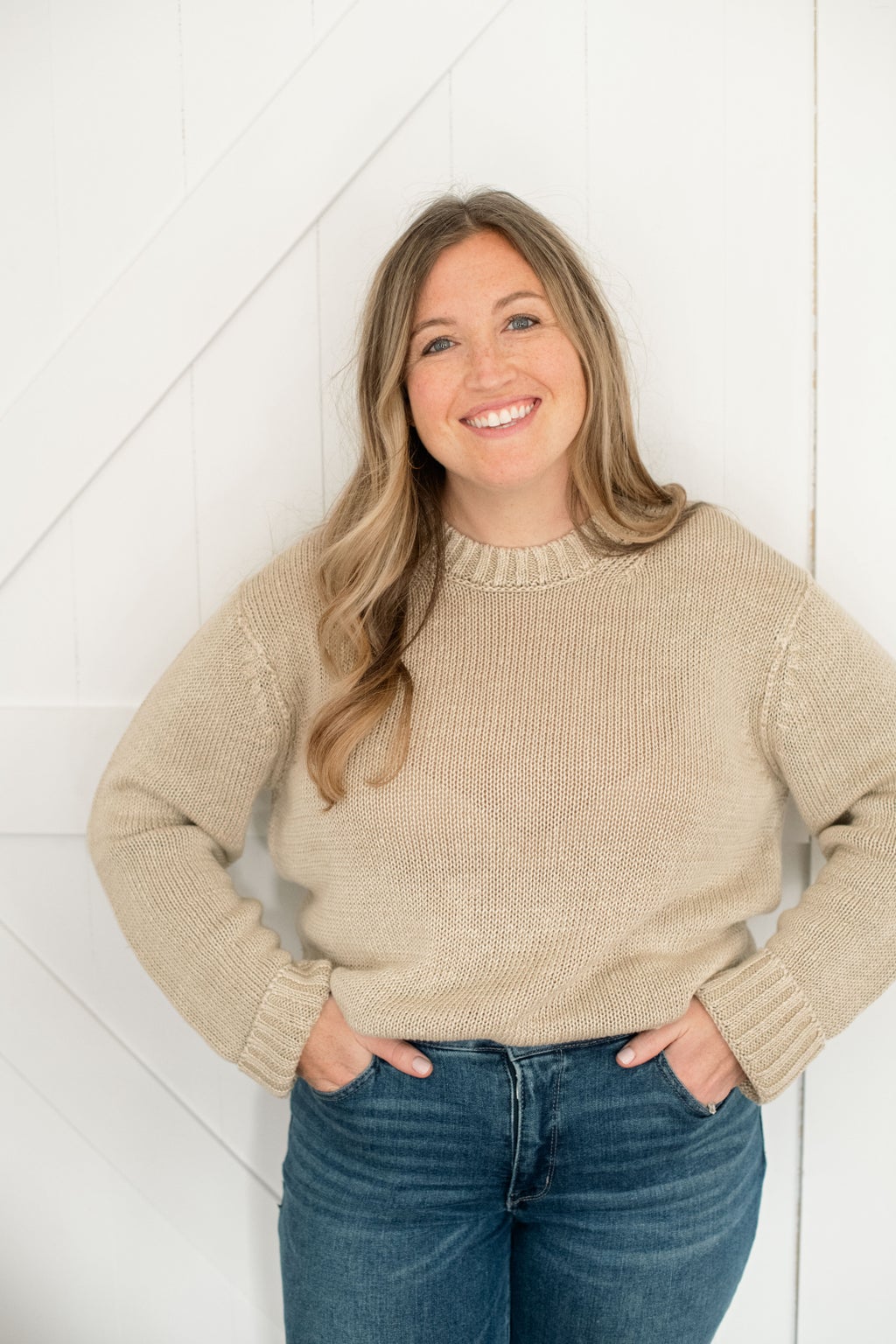
Can you talk a little bit about your certifications — what those mean in the wellness space — and then how Wisebodi came about?
I would have to backtrack all the way to being at UConn, where I studied anthropology and journalism, and I was really interested in how our culture impacts our thinking and our behavior. Eventually, I started working for a health coaching company in the media department, but as part of my role there, I became a certified health coach. I went through the process of exploring different modalities with the intention of learning more about not only the industry I was in and the work I was doing, but also eventually maybe doing that myself and working with people on their health and wellness goals. As part of that process, I realized that a lot of the health and wellness industry was actually pretty harmful for our relationship with food.
That’s when I stumbled into intuitive eating, the framework developed by Evelyn Tribole and Elyse Resch. After devouring everything I could about the topic and seeing how much it impacted me in a positive way, I started training with their company and became a certified intuitive eating counselor. With Wisebodi, we shifted our work as health coaches helping people with their goals into really specifically focusing on this idea of helping women and the battle with food. It’s really a lot of mindset work, a lot of shifting our thinking around food and our bodies, and a huge part of that is looking at how our culture plays a role and looking at the conditioning and the beliefs that we have. They are deeply ingrained in us from a young age, impacting our thinking about ourselves, our bodies, and our eating patterns.
All of that is a long, winding road over the past 10 years or so to where we are now with Wisebodi, which is now an established place for helping women heal their relationship with food. In our current business, we offer coaching programs. Our signature program offers coaching and community, so other women who are going through the same challenges can really get to know each other and realize they’re not alone. It’s a really beautiful place to be so you can work through it with other like-minded women who support each other. We also have some online courses as well, our podcast, we do some events and blogging, and all that good stuff.
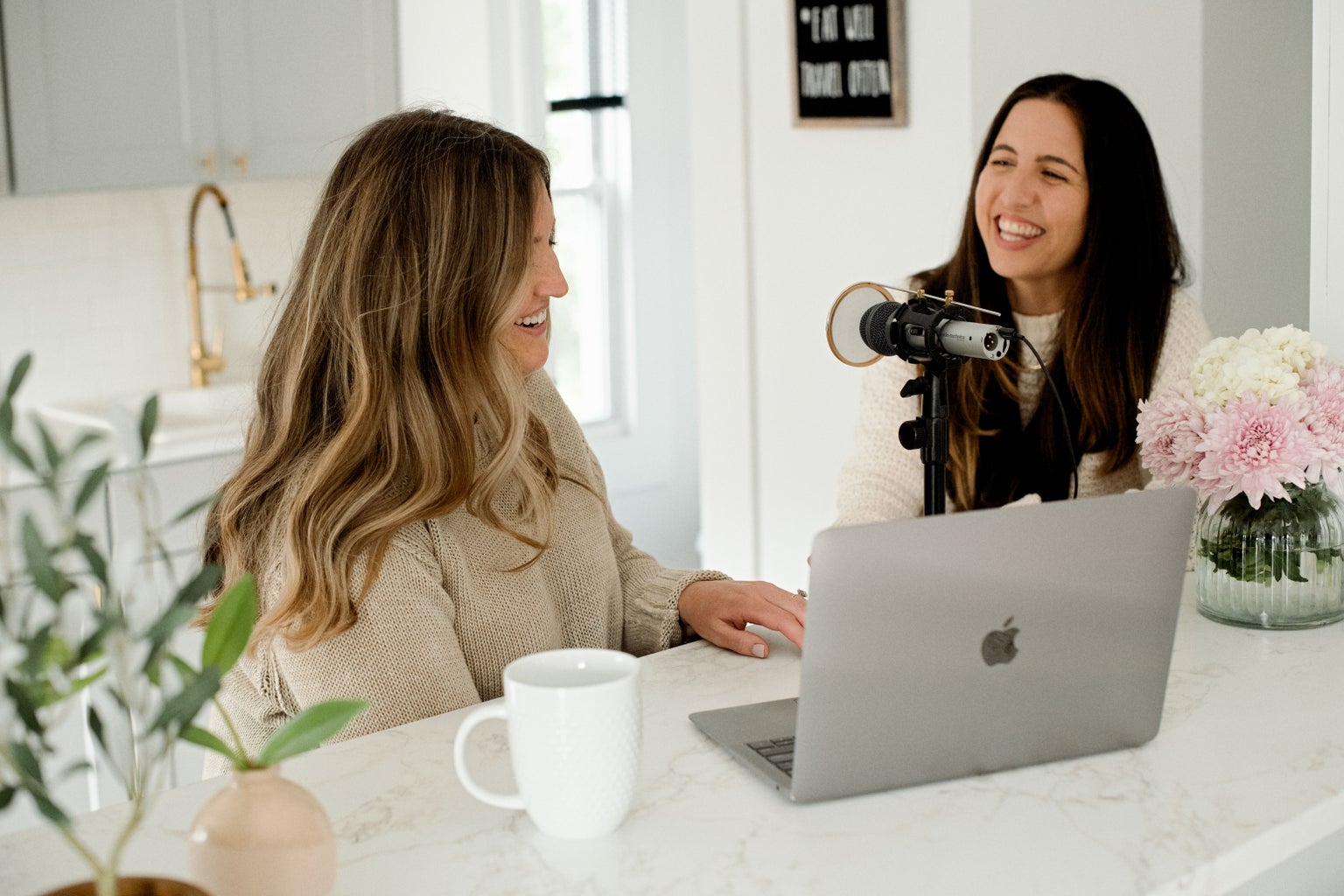
what is your definition of intuitive eating for those who might not have heard of it?
Intuitive eating itself is actually described as a self-care framework through eating. So it’s a way to take care of yourself by learning how to block out all of the noise from the dieting industry, and tune out all of the information overwhelm that we see in the nutrition world. This allows you to really get in touch with your own body’s wisdom. We believe that you are the best expert on your own body, we just have been told otherwise for a very long time. So intuitive eating really is for everyone.
“You are the best expert on your own body”
If you think about it, babies or toddlers eat very intuitively before they grow up and are told all these different things about food, and how they’re supposed to eat in order to control their bodies. We all have an intuitive eater inside of us, but it’s specifically helpful for people who struggle with chronic dieting, and I don’t mean just formal dieting — counting calories, weight watchers, or Atkins — but also the diet brain and mentality. So things like trying to limit certain food groups or limiting eating to certain time windows, “lifestyles” that are often disguised diets. For people who are struggling with trying to figure out the best way to eat in order to control weight specifically and are feeling really out of control around food, intuitive eating allows them to really reclaim all that brain space, time, and energy that is taken up by food and start to learn how to tap into their body’s own wisdom.
We specifically work on eliminating any barriers to what we call “interoceptive awareness,” which is being aware of how your body feels, what your body needs at any given moment. A lot of that can look like getting in touch with your hunger and fullness cues, and responding to what is in front of you. We look at what type of eater you are and what works best for you. But really at the end of the day, it’s about blocking out diet culture and this constant pursuit of weight loss in order to change your body and adhere to societal beauty standards, and instead learn how to tap into your body’s innate wisdom. This allows you to not only feel your best, but to also learn how to trust yourself and your instincts.
This time of year especially, we get the “new year, New me” diet messaging thrown our way. I’m curious what you think about new year’s resolutions, and WHAT advice you have for women to take it as a fresh start in a healthy way?
We’re definitely not opposed to some fresh start energy — that can be really helpful and powerful. What we are opposed to is really intense marketing from diet companies that are telling us that we need to adhere to really strict all-or-nothing-type thinking that can cause us to fall back into some harmful patterns. There is certainly nothing wrong with a resolution to feel better or maybe address stress levels or energy levels or think about taking care of yourself in a different way, but we want to look at what is not only realistic and sustainable but also what is the real goal here. Is this about feeling our best, or is this about how we look and doing something that is going to “fix” our bodies?
Focus on your intention, and start really small. Maybe a great intention is to think about food differently this year; maybe a great intention is to relax a little bit and try to get out of this thinking of constantly trying to change ourselves or beating ourselves up for things that actually are not wrong. If you look a little bit deeper under some of the marketing, it’s really just about the bottom line for these diet companies. We can step out of that and say, “Nothing is wrong with me. I don’t necessarily need a whole new me. What is important to me right now and how can I do that in a way that feels good?” and really focus on habits that are actually health-affirming. These can include moving in a way that feels good, or drinking more water, or getting more quality sleep — things that are actually going to move the needle to address how we want to feel, as opposed to focusing only on weight loss goals or body size, which aren’t effective goals anyway.
WITH OUR AUDIENCE BEING COLLEGE WOMEN SPECIFICALLY, IT CAN BE VERY DIFFICULT TO FIND A HEALTHY RELATIONSHIP WITH FOOD DURING THIS TIME. WHETHER WE’RE STRUGGLING AT THE DINING HALL OR COOKING FOR OURSELVES FOR THE FIRST TIME, IT’S CHALLENGING. WHAT ADVICE DO YOU HAVE FOR COLLEGE WOMEN WHO ARE DEALING WITH THESE ISSUES AND WANT TO LEARN MORE?
First, we really have to look at the messages that we’re getting, whether that’s in media, or from other people, or in society around us. Work on starting to be a conscious consumer and practice some media literacy — so, what are the messages I’m getting and how is it impacting me in my relationship with food and my body? For example, if I’m watching a TV show that is constantly objectifying women or the characters’ whole identity is wrapped up in how they look, what’s the message that’s sending?
The next thing is starting to look at how we’re thinking around food — starting to be aware of our thoughts. Am I looking at food as something that I need to control in order to control my body size? Am I looking at food as good or bad? Just starting there with some awareness about our relationship with food. Is it something that I’m spending a ton of time thinking about? Is it something that is very fraught for me, and that I get anxious about?
Then from there, starting to think about, well if I am stuck in a dieting cycle, if I do have a lot of diet thinking, what are the tools that I’m currently leaning on? Where is the diet mentality coming in? The very first step of intuitive eating is to reject the diet mentality. So, am I using any apps to control food right now? Am I getting any newsletters or do I follow any Instagram accounts that are influencing my thinking around food in a really negative way? And then we just want to start to observe and allow ourselves to eat, paying attention to what thoughts are coming up around our inner eating experiences.
So if I’m sitting down to a meal and my first thought is judgment around what I’m eating, start to notice these voices and expectations that are coming in. Start to practice this idea of allowing everything and tuning into how we’re feeling, and being guided by that as opposed to all the diet noise out there that tells us what we’re eating is right or wrong. The whole intuitive eating framework is really helpful. There are 10 principles, and they all work together. They’re really helpful for getting in touch with that intuitive wisdom and taking it into our day-to-day and eventually honoring some gentle nutrition. We’re adults. We know that there’s a nutritional difference between an apple and a piece of apple pie, but when it comes to intuitive eating, we want to look at food as more neutral, and start to tune into how things make us feel and be guided by that.
I love that, and I love the emphasis on media literacy. In terms of diet culture it’s very necessary, and even like you said something in a tv show can be very subtle, and we can subconsciously be taking in these things.
Yeah, and especially on social media — Instagram wasn’t around when I was in college, so I can’t even imagine how much that plays a role in our thinking now, being such a visual platform. But in my own life I can speak to it today — we have to really understand what goes into a single Instagram post sometimes. Who is being paid to promote specific content? What is the message if we follow an influencer who is sharing what they eat in a day? Not only do we not know what’s going on behind the scenes, we don’t know how someone is feeling in their day-to-day, we don’t know what sort of diet rules they’re following, and we certainly are not seeing binge eating on Instagram. So really just trying to start to think about it more critically, and at the end of the day, what works for someone might not work for someone else. So just starting to block out all the noise that we get on these platforms and asking what sorts of messages they’re sending to women about their bodies and their self-worth, and what we need to look like in order to be happy and healthy and successful as women in this culture.
You make a great point about social media — we’re being exposed to it younger and younger. I think with the pandemic especially — that’s when I got on tiktok — it has been a double-edged sword. I’m curious how you think the pandemic as well as tiktok has influenced wellness culture and diet culture.
I think there’s positives and negatives to all of it. So, on the one hand, tools like social media can provide a really great platform for representation. We’re seeing more people of all different body sizes, of all different backgrounds, contribute to the conversation, and I think that that’s a huge plus, not only just to learn from different people on social but also maybe you can see yourself in some of these people when you didn’t have access to that otherwise. On the flip side, some of the messages that we get around body size and food are now being magnified. An influencer who has millions of followers can easily impact tons of people without a filter of any sort — and this is why it is so crucial to be critical consumers of media as women because we need to be able to stop and examine the messages that we’re getting, and that’s particularly harmful for the younger population.
What we know about brain development and our beliefs is that they start from a very young age, and they tend to stick with us. So if someone who is younger is able to access TikTok and they’re getting a message about a certain diet or something about their body being wrong, that message can impact them much deeper and it can really stick with them into adulthood. It might be more magnified when you’re younger, but it certainly affects women of all ages who are consuming information. So it can be really dangerous, especially on these visual platforms where we’re seeing influencers share information.
As it relates to the pandemic, I think a couple things. First of all, people are using social media much more. During the pandemic, most people were certainly on their phones and consuming online content much more frequently, so it’s an opportunity for these messages to be spread with much more frequency. But then also as it relates to food, we’ve noticed that people who are chronic dieters or struggle with food, that struggle might be magnified because it’s more stressful for a lot of people, and our lifestyles and our routines were impacted greatly. We’re home more, so someone who might struggle with sitting at their kitchen table working with easy access to the kitchen, who hasn’t really looked at their relationship with food, it might cause a lot more emotional eating just because of access. I think it’s a combination of our routines changing and stress levels, and just high emotions that all play a role in our relationship with food, so we’ve seen some challenges really magnified.
Finally, i’d love to hear a little bit about how your time at uconn and Her Campus specifically has helped inform your career in wellness, your business acumen, and your journey to intuitive eating as a whole.
I think it started out for me as a way to get experience, and I’ve always been interested in creating things and collaborating with other women. So what started as a way for me to just get some experience and create something really turned into a way to speak about some of these issues that specifically relate to women that I’m passionate about, and create a space that I didn’t think existed. Really at the core of everything that I’ve done is to create a space for and advocate for women, and to start to shed some light on challenges and issues in our world that relate to women. I didn’t see that at the time, but looking back at my whole career, I can see that was really at the core, and just to make a better world for women.
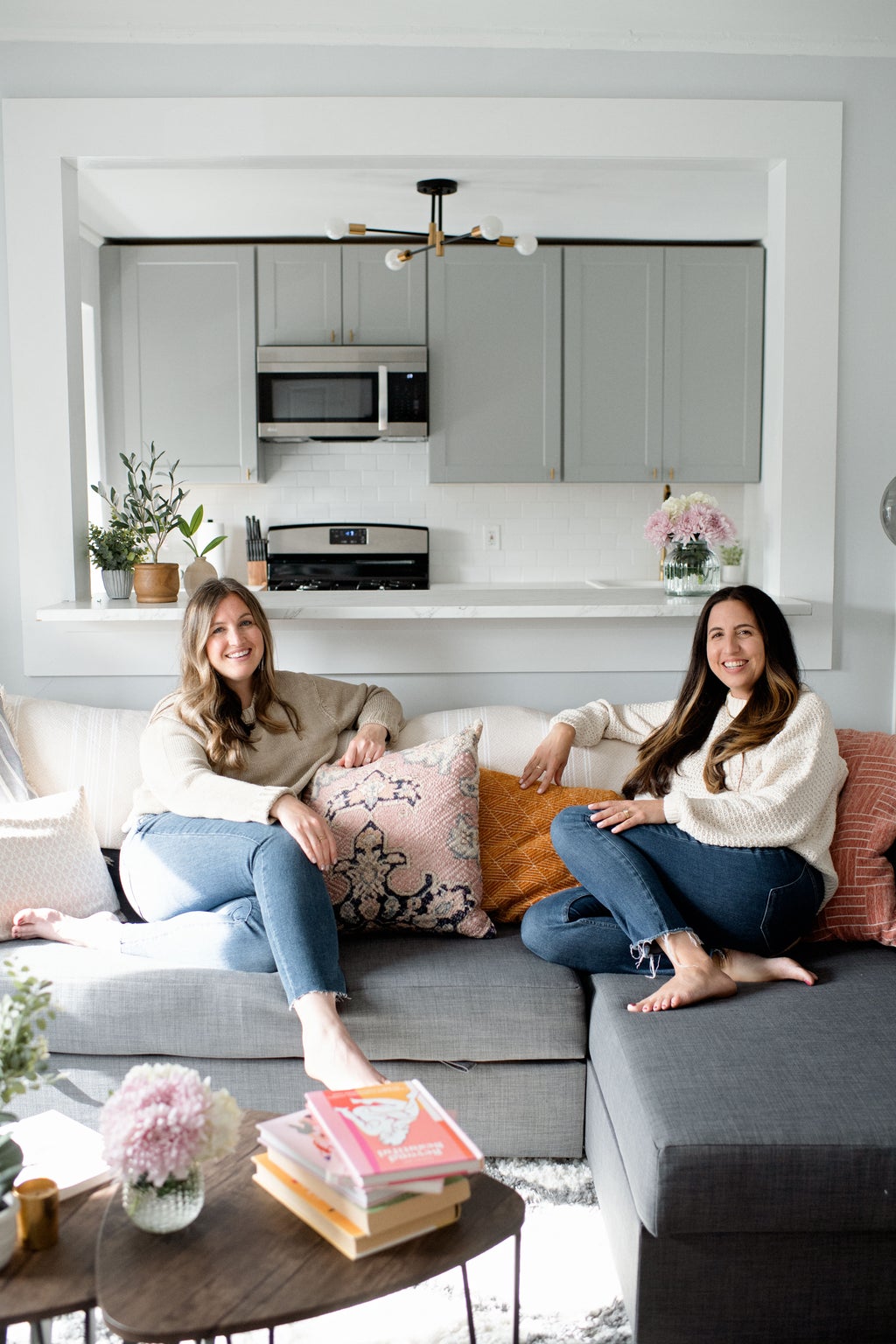
Looking back as a whole on my career trajectory, I can see that following what I was passionate about and what I was interested in was the right route for me personally. I don’t think that’s the case for everyone, but it has kept it interesting and it has kept it sustainable. I think you have to really look at your “why,” and looking at my own personal challenges with food and my body, that intersection of a challenge that I struggled with in my own life and that I was interested and passionate about helping other people with. That “why” keeps me going and that “why” affects everything that I do in my work.
If I were to share some advice for other people starting out, you don’t have to know your “why” right now. You don’t have to refine that. But I think the closer you can get to it and the more you follow things you’re passionate about and where you see places to help and spaces where you can make a difference, it can really help guide a passionate, enjoyable, sustainable career path in the long run. Looking back on that time, I can see little tiny steps toward that “why.” Try to figure out what you enjoy, what you’re passionate about, and where you can make a difference is a helpful way to think about it. It’s different for everyone, but in terms of what I was doing at that time, it was the start of that whole journey.
If you or someone you know has an eating disorder and needs help, call the National Eating Disorders Association helpline at 1-800-931-2237, text 741741, or chat online with a helpline volunteer here.
